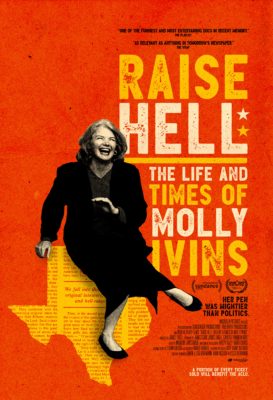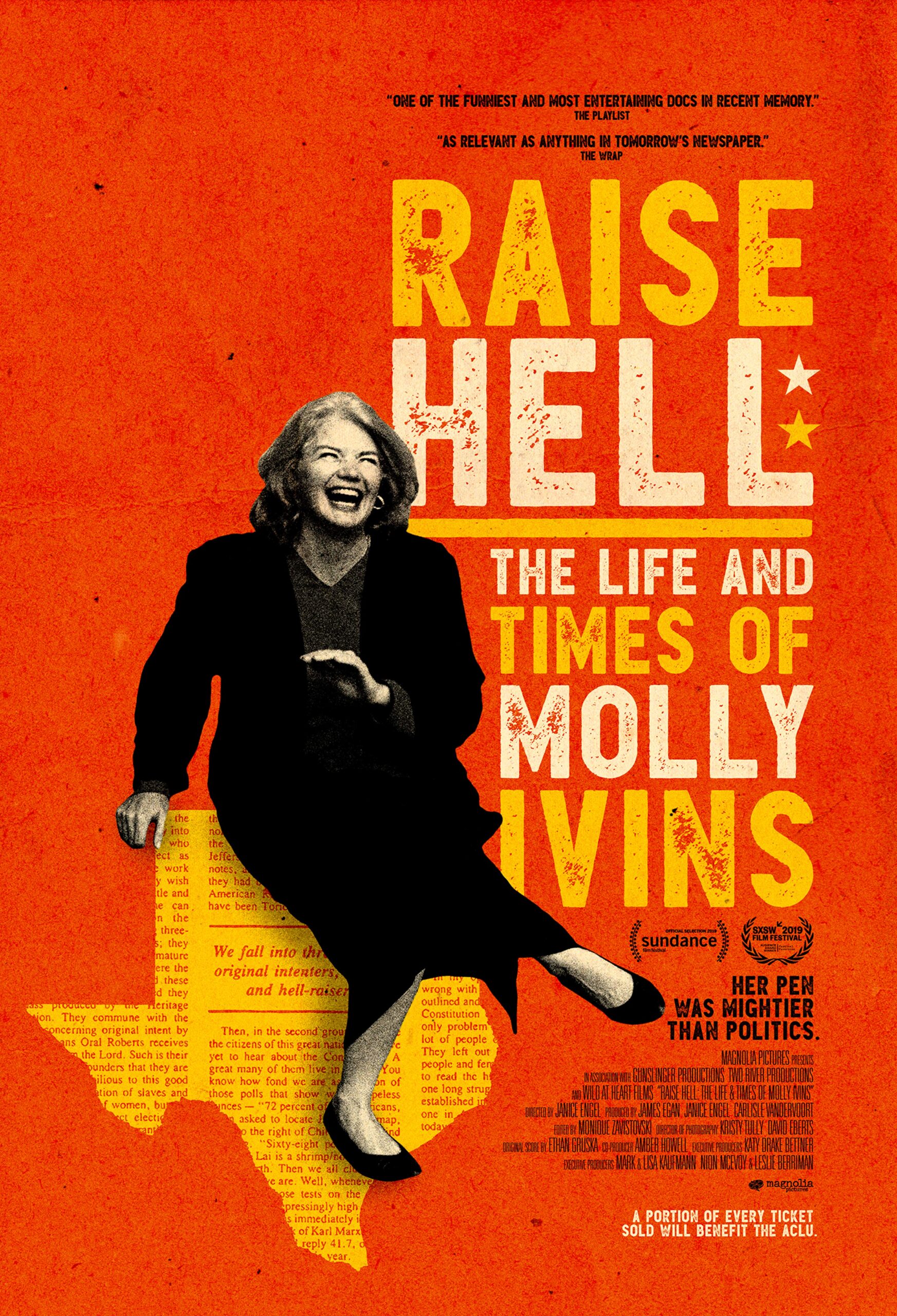I wish Molly Ivins was still alive so that we could hear the full force of her wicked wit being unleashed upon Donald Trump and his minions.
Ivins, a renowned journalist with a career spanning from the late 1960s to her death of cancer in 2007, is the subject of the new film “Raise Hell: The Life and Times of Molly Ivins.” At the height of her career, her column was syndicated at 400 newspapers across the country. She was also the author of multiple best-selling books and a three-time finalist for the Pulitzer Prize.

Release Year: 2019
Directors: Janice Engel
Running Time: 1 hour, 33 minutes
Watch trailer
And she was riotously funny.
She targeted her wit at those who most deserved to be criticized, those with a lot of power and perhaps not a lot of sense or compassion.
“She aimed at the right people,” says MSNBC’s Rachel Maddow in the film.
While she was most well-known for her commentary on Republican politicians, especially George W. Bush, whom she often said she “accidentally became an authority” on, she also didn’t hesitate to call out Democrats when they didn’t live up to her populist, progressive values.
For example, she (and many other progressives) disagreed with President Bill Clinton’s legislation cutting assistance for needy families. She was so upset, she didn’t vote in the 1996 presidential election, refusing to vote for Clinton, and of course would not vote for the Republican candidate, Senator Bob Dole.
Ivins shrewdly observed that the political spectrum in the United States of America runs not from left to right, but from top to bottom.
Indeed, the title of one of her eleven books was “You Got to Dance With Them What Brung You,” referring to politicians being beholden to their big-money donors. She argued that there was a need to “fix the system so that there’s no one for legislators to dance with but us, because we’re the ones that brung ’em.”
She was somewhat prophetic in this sense, seeing how things were and recognizing the need to address it.
Instead, things have gotten even worse since the time of her statements, with the Supreme Court’s decision in the Citizens Corporations United case opening up the doors to even more money in politics than there was before.
Dan Rather, respected CBS broadcast journalist, points out in the film that “Ivins threatened the narrative” that politicians wanted.
Rather also discusses Ivins’ legacy. “How many legendary print journalists are there?” he notes. “Molly is on the top of that list.”
Ivins was born and raised in Texas, and spent part of her early career covering the Texas state legislature in Austin, Texas.
“Texas has always been the national laboratory for bad government. I mean, if you want to see a bad idea tried, we’ve tried it,” she said. When George W. Bush was elected, she knew that the themes of Texas politics — “anti-intellectualism, religiosity, and machismo” — would become hallmarks of national politics. ’
Once again, she was unfortunately correct in her predictions.
“Next time I tell you someone from Texas should not be President of the United States, please pay attention,” she wrote in a 2001 column and repeated in subsequent speeches.
After the terrorist attacks of September 11th, 2001, being a critic of Bush became a more precarious proposition, but Ivins stuck to her ideals.
She was one of the first and most sustaining voices in the media to question the invasions of Iraq and Afghanistan. “Good thing we won the war, because the peace sure looks like a quagmire,” she wrote in October 2003.
Once again, her insights were prophetic.
Though Bush would memorably stand in front of a “Mission Accomplished” sign on an aircraft carrier in May of that year, the occupation of Afghanistan continues. Meanwhile, United States troops went back to Iraq from 2014 to 2017 to fight the rise of the Islamic State group, after having first left the country in 2011.
Ivins was a critical voice for many years, one that has been greatly missed, especially as many of the biggest media companies and voices have been failing in one of their critical functions: to question and analyze the information they receive, not just repeat the messages of candidates and public officials.
Ivins is no longer with us, but hopefully “Raise Hell” will inspire more people to become the type of journalists that our society so desperately needs right now. I left the film reinvigorated for the on-going fight against the Trump regime, but also thoroughly entertained from Ivins’ humor and clever turns-of-phrase.
“Raise Hell” is currently showing at the SIFF Cinema Uptown in Seattle, and also at the Barnyard Cinema in Winthrop, Washington.
Unfortunately, it is not currently screening anywhere in Oregon or Idaho.
As Ivins was a vocal First Amendment advocate, a portion of all ticket proceeds will go to the American Civil Liberties Union (ACLU).

